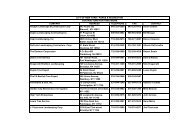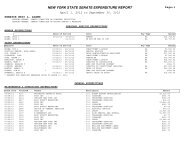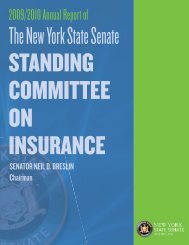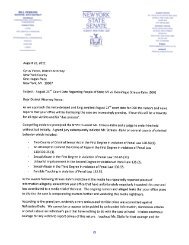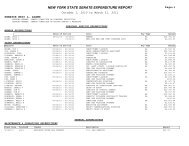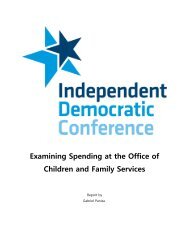Crime Committee Report e.indd - New York State Senate
Crime Committee Report e.indd - New York State Senate
Crime Committee Report e.indd - New York State Senate
Create successful ePaper yourself
Turn your PDF publications into a flip-book with our unique Google optimized e-Paper software.
S.8229 HASSELL-THOMPSON / A 11602 Lentol<br />
Public defenders to have access to DCJS Criminal History Databank<br />
6/30/10 – Passed <strong>Senate</strong><br />
Agencies that are defined as “qualified agencies” under Executive Law § 835(9) have access<br />
to the criminal history records maintained by the Division of Criminal Justice Services. See Executive<br />
Law § 837(6); 9 NYCRR Part 6051. The proposed bill would add public defenders, legal<br />
aid societies, and administrators of assigned counsel programs to the list of qualified agencies.<br />
Public defense providers would then be able to enter into use and dissemination agreements<br />
with the Division of Criminal Justice Services that would govern their access to criminal history<br />
information.<br />
In order to provide effective representation, including bail applications, case investigation,<br />
plea negotiation, and sentencing advocacy, public defense attorneys need to have ready access<br />
to criminal history reports of clients and witness. Currently, public defense providers rely on<br />
district attorneys, judges, and other members of the criminal justice community for access to<br />
criminal history reports; often, disclosure of these reports is not timely. Providing public defense<br />
counsel direct access to criminal history reports will help them provide effective representation<br />
to their clients and will improve the efficiency of the entire criminal justice system in<br />
<strong>New</strong> <strong>York</strong> <strong>State</strong>.<br />
S.4688 HASSELL-THOMPSON, DIAZ, KRUEGER / A8195 Lentol<br />
Updating Criminal Mischief Statute<br />
6/15/10 - Passed <strong>Senate</strong><br />
The bill amends section 145.05 of the Penal Law to raise the monetary property damage<br />
threshold from ($250) to $1,000.<br />
The bill also amends section 145.10 of the Penal Law to raise the monetary property damage<br />
threshold from ($1,500) to $3,000. The bill amends subdivision 6 of section 352-c of the<br />
general business to raise the monetary threshold from ($250) to $1,000.<br />
Current monetary thresholds for criminal mischief in the second and third degrees (Penal Law<br />
sections 145.05 (2) and 145.10, respectively) are too low and should be raised to conform to the<br />
higher thresholds established by the Legislature in 1986 for comparable theft and stolen propertyrelated<br />
felony offenses such as grand larceny, criminal possession of stolen property and insurance<br />
fraud.<br />
Accordingly, this measure adjusts for inflation to reflect the realities of the monetary world<br />
of 2009. Present monetary thresholds are unrealistically low and unduly strain police resources.<br />
While felony arrests for low-level thefts are routinely reduced to misdemeanors by prosecutors<br />
and judges, the police must adhere to the law and process a three hundred dollar theft<br />
as a felony. This requires substantial allocation of resources and reduces the number of police<br />
officers available for patrol. In addition, this measure would correct a related anomaly in the<br />
law amending subdivision six of the General Business Law section 352-c to raise to $1,000 the<br />
current $250 threshold for the class E felony securities fraud offense.<br />
Standing <strong>Committee</strong> on <strong>Crime</strong> Victims, <strong>Crime</strong> and Correction | 2009-2010 <strong>Report</strong> 55


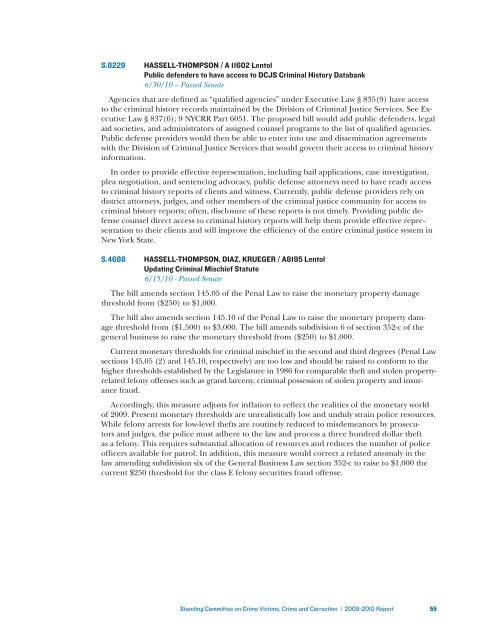
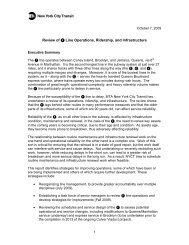


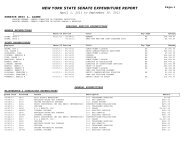
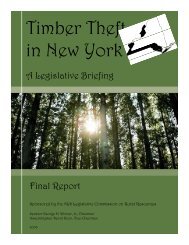

![[PDF] Proposed MTA Capital Program - New York State Senate](https://img.yumpu.com/24854139/1/190x245/pdf-proposed-mta-capital-program-new-york-state-senate.jpg?quality=85)

